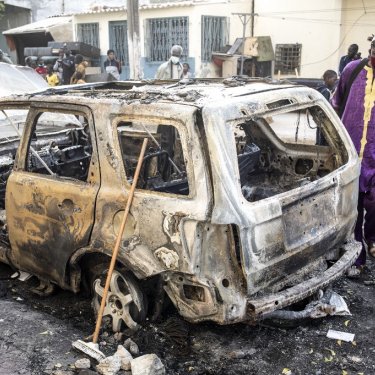RSF decries exceptional press freedom violations in Senegal

As Senegal continues to be shaken by protests and clashes in response to the opposition leader’s arrest, Reporters Without Borders (RSF) condemns a wave of press freedom violations unlike anything seen in recent years in this West African country.
The tension of the past few weeks has not spared the media. The day after President Macky Sall’s leading political opponent, Ousmane Sonko, was arrested on a rape charge on 3 March – triggering a wave of protests and scenes of violence through the country – the National Council for Broadcast Regulation (CNRA) suspended two privately-owned TV channels, SenTV and WalfadriTV, accusing them of “irresponsible coverage” and “flagrant breaches” of regulations.
The previous day, the CNRA had issued a warning to these two channels and a third one, 2STV, saying it had noted that they were broadcasting “repeated calls for a popular uprising by constantly transmitting insurrection footage.”
Media outlets are also being subjected to deliberate physical violence. Yesterday evening, individuals partially destroyed the walls at the front of the building housing the RFM radio station and the L’Observateur newspaper, which are both owned by musician Youssou Ndour’s media company, Groupe Futurs Médias (GFM). RSF has also learned that individuals attacked and set fire to the premises of the national daily Le Soleil.
Journalists were injured on 2 March when the police dispersed a demonstration taking place as Sonko was making his way to a Dakar court in response to a summons.
Disruption has been reported on social media such as YouTube, Facebook and WhatsApp, and has been confirmed by the RSF bureau in Dakar.
“We urge the authorities not to turn news and information, and those who produce it, into additional victims of this violence,” said Assane Diagne, the director of RSF’s West Africa office. “We ask the media regulator to rescind the suspension orders, which constitute a serious violation of the freedom to inform and be informed. We also condemn the physical attacks, for which there is no justification, and we remind the authorities of their obligation to guarantee the safety of journalists and their workplaces.”
In a press release yesterday evening, the government warned against “tendentious coverage of events by certain media that is likely to fuel hatred and violence.”
WalfadriTV director Moustapha Diop told RSF he regarded his TV channel’s suspension as “unacceptable and outrageous” because all the channel had done was provide “live retransmission of the images of the rioting in Dakar and other parts of the country.” He added that several internal meetings had been held at which it was stressed that the channel had a duty to “not add anything” and to “limit itself to informing fairly and accurately.”
The Senegal Union of News and Communication Professional (SYNPICS) reacted quickly, describing the suspension of the two TV channels as a “plan to decapitate the Senegalese media” and all the attacks against journalists and media as a threat to Senegal’s “system of governance.” SYNPICS also asked the interior minister to “take all appropriate measures to guarantee the safety of the media, regardless of their editorial line.”
Senegal is ranked 47th out of 180 countries in RSF's 2020 World Press Freedom Index.



